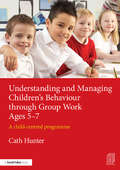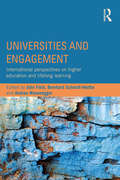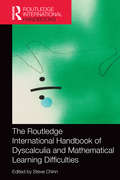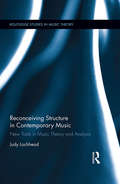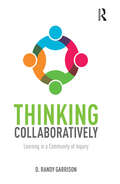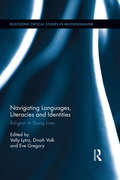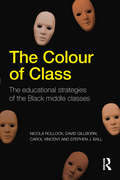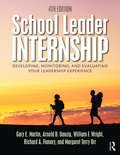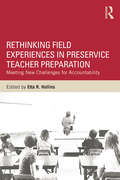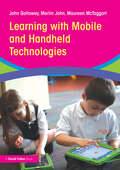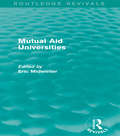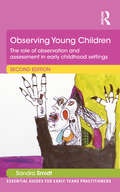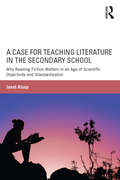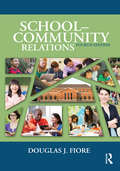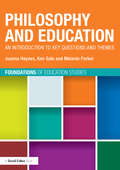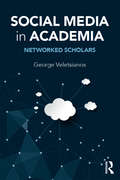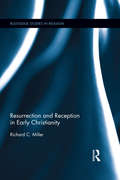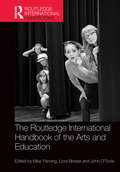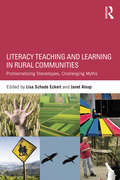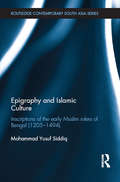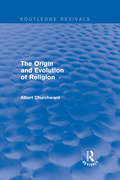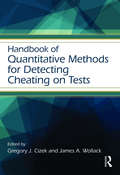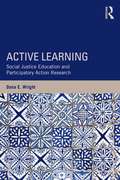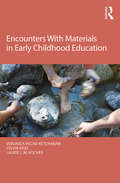- Table View
- List View
Understanding and Managing Children's Behaviour through Group Work Ages 5-7: A child-centred programme
by Cath HunterUnderstanding and Managing Children’s Behaviour 5-7 provides the reader with an insight into children’s emotional well-being and helps them to understand what and how children communicate and how to respond in a way that provides positive messages, increases their emotional vocabulary and encourages them to change their behaviour. It provides an alternative and effective child-centred way of managing children’s behaviour through introducing the concept of reflective language and other tools, equipping staff with new skills that are transferable across the school in any role. The book is divided into two sections, enabling the reader to link theory with practice. The first section takes the reader on a journey to help them understand the different factors that influence children’s behaviour. The second section of the book focuses on the group work programmes, how they can be used, their value and the impact they can have on children and the school as a whole. The activities in the group work programmes explore the concept of using reflective language as a behaviour management tool and are designed to motivate and build confidence, self-esteem and resilience. Useful pedagogical features throughout the book include: practitioner and classroom management tips and reflective tasks; strategies and practical ideas for staff to use to help them engage more deeply with the contents of the book; flexible, tried and tested group work programmes designed to promote inclusion rather than exclusion; clear step-by-step instructions for delivering the group work programmes; case studies showing behaviour examples with detailed explanations for the behaviour and strategies to respond to it. This book is aimed at all KS1 primary school staff, especially teaching assistants, learning mentors and family workers who can deliver the group work programmes. It is also recommended reading for SENCOs and trainee teachers, and will be useful for therapists who work with children and are looking at delivering other approaches in their work.
Universities and Engagement: International perspectives on higher education and lifelong learning
by John Field Bernhard Schmidt-Hertha Andrea WaxeneggerUniversities and Engagement is a timely and insightful book that examines what universities can contribute to their communities and economies through lifelong learning, a topic which is of increasing importance to Higher Education Institutions across the world. The book will offer an answer to the question ‘What can be understood by University Lifelong Learning today?’ by collating the work of specialists from across Europe and beyond who have first-hand experience in the field of university engagement through continuing education. With a diverse range of expertise from the UK, Ireland, Germany, Finland, Malta, Belgium, New Zealand, Austria and the USA, readers are guaranteed a varied and informative collection of perspectives on this important topic. Taken as a whole, the book provides a theoretical background for readers, drawing on recent research and practice examples from a variety of countries and institutional settings, as well as demonstrating a variety of conceptual approaches, confirming the diverse range of possible solutions. Key topics covered include: research into policy and practice; engaging with business and industry; engaging with communities; engaging with an ageing society; active citizenship and regional competitiveness. Developed in collaboration with the European University Continuing Education Network (EUCEN), Universities and Engagement is an invaluable contribution to research in the subject of lifelong learning. It will be of value to academics, practitioners and professionals with an interest in higher education and community management, and will be particularly suited to those interested in lifelong learning, adult education and community development.
The Routledge International Handbook of Dyscalculia and Mathematical Learning Difficulties (Routledge International Handbooks of Education)
by Steve ChinnMathematics plays an important part in every person’s life, so why isn’t everyone good at it? The Routledge International Handbook of Dyscalculia and Mathematical Learning Difficulties brings together commissioned pieces by a range of hand-picked influential, international authors from a variety of disciplines, all of whom share a high public profile. More than fifty experts write about mathematics learning difficulties and disabilities from a range of perspectives and answer questions such as: What are mathematics learning difficulties and disabilities? What are the key skills and concepts for learning mathematics? How will IT help, now and in the future? What is the role of language and vocabulary? How should we teach mathematics? By posing notoriously difficult questions such as these and studying the answers The Routledge International Handbook of Dyscalculia and Mathematical Learning Difficulties is the authoritative volume and is essential reading for academics in the field of mathematics. It is an incredibly important contribution to the study of dyscalculia and mathematical difficulties in children and young adults.
Reconceiving Structure in Contemporary Music: New Tools in Music Theory and Analysis (Routledge Studies in Music Theory)
by Judy LochheadThis book studies recent music in the western classical tradition, offering a critique of current analytical/theoretical approaches and proposing alternatives. The critique addresses the present fringe status of recent music sometimes described as crossover, postmodern, post-classical, post-minimalist, etc. and demonstrates that existing descriptive languages and analytical approaches do not provide adequate tools to address this music in positive and productive terms. Existing tools and concepts were developed primarily in the mid-20th century in tandem with the high modernist compositional aesthetic, and they have changed little since then. The aesthetics of music composition, on the other hand, have been in constant transformation. Lochhead proposes new ways to conceive musical works, their structurings of musical experience and time, and the procedures and goals of analytic close reading. These tools define investigative procedures that engage the multiple perspectives of composers, performers, and listeners, and that generate conceptual modes unique to each work. In action, they rebuild a conceptual, methodological, and experiential place for recent music. These new approaches are demonstrated in analyses of four pieces: Kaija Saariaho’s Lonh (1996), Sofia Gubaidulina’s Second String Quartet (1987), Stacy Garrop’s String Quartet no.2, Demons and Angels (2004-05), and Anna Clyne’s "Choke" (2004). This book defies the prediction of classical music’s death, and will be of interest to scholars and musicians of classical music, and those interested in music theory, musicology, and aural culture.
Thinking Collaboratively: Learning in a Community of Inquiry
by D. Randy GarrisonThinking Collaboratively is a theoretical and practical guide to thinking and learning in deep and meaningful ways within purposeful communities of inquiry. Critical thinking has long been recognized as an important educational goal but, until now, has largely been conceived and operationalized as an individual attitude and ability. Increasingly, however, a more relevant and complete cognitive construct has been emerging: thinking collaboratively. Thinking collaboratively is the means to inquire, test, and apply new understandings, and to make sense of the information that bombards us continuously. In short, thinking collaboratively is required to flourish in our highly connected world and, in this book based on more than a decade of research, Garrison provides an essential introduction to this vital concept.
Navigating Languages, Literacies and Identities: Religion in Young Lives (Routledge Critical Studies in Multilingualism)
by Eve Gregory Vally Lytra Dinah VolkNavigating Languages, Literacies and Identities showcases innovative research at the interface of religion and multilingualism, offering an analytical focus on religion in children and adolescents’ everyday lives and experiences. The volume examines the connections between language and literacy practices and social identities associated with religion in a variety of sites of learning and socialization, namely homes, religious education classes, places of worship, and faith-related schools and secular schools. Contributors engage with a diverse set of complex multiethnic and religious communities, and investigate the rich multilingual, multiliterate and multi-scriptal practices associated with religion which children and adolescents engage in with a range of mediators, including siblings, peers, parents, grandparents, religious leaders, and other members of the religious community. The volume is organized into three sections according to context and participants: (1) religious practices at home and across generations, (2) religious education classes and places of worship and (3) bridging home, school and community. The edited book will be a valuable resource for researchers in applied linguistics, linguistic anthropology, socio-linguistics, intercultural communication, and early years, primary and secondary education.
The Colour of Class: The educational strategies of the Black middle classes
by David Gillborn Stephen J. Ball Carol Vincent Nicola RollockHow do race and class intersect to shape the identities and experiences of Black middle-class parents and their children? What are Black middle-class parents’ strategies for supporting their children through school? What role do the educational histories of Black middle-class parents play in their decision-making about their children’s education? There is now an extensive body of research on the educational strategies of the white middle classes but a silence exists around the emergence of the Black middle classes and their experiences, priorities, and actions in relation to education. This book focuses on middle-class families of Black Caribbean heritage. Drawing on rich qualitative data from nearly 80 in-depth interviews with Black Caribbean middle-class parents, the internationally renowned contributors reveal how these parents attempt to navigate their children successfully through the school system, and defend them against low expectations and other manifestations of discrimination. Chapters identify when, how and to what extent parents deploy the financial, cultural and social resources available to them as professional, middle class individuals in support of their children’s academic success and emotional well-being. The book sheds light on the complex, and relatively neglected relations, between race, social class and education, and in addition, poses wider questions about the experiences of social mobility, and the intersection of race and class in forming the identity of the parents and their children. The Colour of Class: The educational strategies of the Black middle classes will appeal to undergraduates and postgraduates on education, sociology and social policy courses, as well as academics with an interest in Critical Race Theory and Bourdieu. The Colour of Class was awarded 2nd prize by the Society for Educational Studies: Book Prize 2016.
School Leader Internship: Developing, Monitoring, and Evaluating Your Leadership Experience
by Arnold B. Danzig Margaret Terry Orr Gary E. Martin Richard A. Flanary William F. WrightSchool Leader Internship, 4th Edition challenges school leader interns to build competencies in 52 leadership skill areas. This unique resource provides step-by-step guidance for interns, their supervisors, and their faculty on how to initiate an internship and evaluate interns' work. In this updated fourth edition, the content is organized around the latest National Policy Board for Educational Administration (NPBEA) Professional Standards for Educational Leaders (2015) and includes intern activities to develop skills in cross-content literacy, distributive leadership, equity in practice, professional learning communities, remediation strategies, school improvement planning, and special populations. This is a critical resource for leadership preparation programs nationwide and the thousands of school districts that support leadership candidates. Special Features include: Beyond the Standards provide further independent practice, reflection, and development for students in the areas of action research, ethical and critical reasoning, dispositions and interpersonal skills, new technologies, school partnerships, and social justice. Self, Peer, and Superior Assessments help students to plan according to individual need, experience, and goals. Internship Plans allow students to assess, analyze, and prepare draft internship plans. Interview Suggestions help students develop a network and gain insight into administrative and curricular responsibility. Professional Development Activities encourage students to analyze and evaluate their experiences and plan for the future. Projects allow students to synthesize their skills.
Rethinking Field Experiences in Preservice Teacher Preparation: Meeting New Challenges for Accountability
by Etta R. HollinsThe focus of this book is the centrality of clinical experiences in preparing teachers to work with students from diverse cultural, economic, and experiential backgrounds. Organized around three themes—learning teaching through the approximation and representation of practice, learning teaching situated in context, and assessing and improving teacher preparation—Rethinking Field Experiences in Preservice Teacher Preparation provides detailed descriptions of theoretically grounded, research-based practices in programs that prepare preservice teachers to contextualize teaching practices in ways that result in a positive impact on learning for traditionally underserved students. These practices serve current demands for teacher accountability for student learning outcomes and model good practice for engaging teacher educators in meaningful, productive dialogue and analysis geared to developing local programs characterized by coherence, continuity, and consistency.
Learning with Mobile and Handheld Technologies: Inside And Outside The Classroom
by John Galloway Merlin John Maureen McTaggartAs technology evolves we are ever more reliant on the use of handheld and mobile devices, yet what do we know about their impact on learning? While there is a lot of interest in mobile technology, many schools still aren’t sure how to best use it for learning and teaching. Learning with Handhelds and Mobiles explores this landscape and offers examples of how these technologies have been used for learning, how the problems that have arisen are being addressed, and offers ideas for the future. This invaluable book gives a voice to teachers and educators using mobiles and technology-enhanced learning in and out of schools, for regular school work and for innovative projects through exciting partnerships like Apps for Good. Learning with Handhelds and Mobiles shows the changes that are taking place within schools as a direct result of these emerging technologies, and contains case studies with accounts of best practice in a variety of settings including primary, secondary, and special schools, and learning beyond their boundaries. The book also explores themes of pedagogy, communication and affordances, collaborative learning, individual creativity and expression, self-directed and informal learning and outdoor education. The learning potential of handheld and mobile devices has excited teachers and educators, but until now there has been no structured, systematic overview available along with reflections on how this technology is changing educational practice. This book brings these together to provide a clearer picture of what is currently a fragmented area, and offers expert views of how we can understand these, and where it may take us next.
Mutual Aid Universities: Radical Forum On Adult Education Ser. (Routledge Revivals)
by Eric MidwinterFirst published in 1984, this collection of essays was the first account of the development of the University of the Third Age in Britain (U3A). Changing employment patterns and increasing pressure on traditional areas of secondary and higher education has led to the idea that learning can be a life-long process. The theories of U3As in Britain, their development under the influence of European models, and the major influences on them are analysed. The authors argue that the consequences of social change and the economic, social, political, sexual and racial inequalities that exist are often reinforced by the inequalities in our educational system. A comprehensive title, this book will be useful to any students with an interest in adult and continuing education.
Observing Young Children: The role of observation and assessment in early childhood settings (Essential Guides for Early Years Practitioners)
by Sandra SmidtThis fully revised second edition of Observing, Assessing and Planning for Children in the Early Years provides a detailed analysis of what is meant by the observation of young learners and why this is so vital to early years practitioners and students. In this accessible and insightful text, Sandra Smidt examines the various theories of how young children develop and learn, which have been put forward by thinkers and writers across time and place so the reader has a genuinely global view of early childhood. She then highlights how important it is for practitioners in schools, nurseries and settings to think carefully about what they have seen and heard in light of what they, as adults, already know about the children and their learning. Also included in this text is a helpful ‘Try Your Hand’ section where readers are invited to make their own judgements about what they have read, as well as a section on observing and assessing not only the nursery-aged children but also babies and toddlers.
A Case for Teaching Literature in the Secondary School: Why Reading Fiction Matters in an Age of Scientific Objectivity and Standardization
by Janet AlsupTaking a close look at the forces that affect English education in schools—at the ways literature, cognitive science, the privileging of the STEM disciplines, and current educational policies are connected—this timely book counters with a strong argument for the importance of continuing to teach literature in middle and secondary classrooms. The case is made through critical examination of the ongoing "culture wars" between the humanities and the sciences, recent research in cognitive literary studies demonstrating the power of narrative reading, and an analysis of educational trends that have marginalized literature teaching in the U.S., including standards-based and scripted curricula. The book is distinctive in presenting both a synthesis of arguments for literary study in the middle and high school and sample lesson plans from practicing teachers exemplifying how literature can positively influence adolescents’ intellectual, emotional, and social selves.
School-Community Relations
by Douglas J. FioreAccessible and practical, School-Community Relations, Fourth Edition provides aspiring educational leaders with the skills to establish strong systems for communicating with their various school constituencies and to improve public relations at all levels. This textbook uses real-life examples to illustrate the ways in which administrators and school leaders can effectively engage and enlist partnerships with teachers, staff, students, parents, and community members. Case studies at the end of each chapter apply the strategies to realistic scenarios, and Questions for Analysis help readers engage critically with the material. Features of this newly revised edition include: Try This At Your School sections that offer insights into the ways in which actual educational leaders have fostered positive school-community relations. Updated information about public opinion, how parents view their local schools, and the current education climate. New strategies for utilizing social media to improve school-community relations and foster a positive school image.
Philosophy and Education: An introduction to key questions and themes (Foundations of Education Studies)
by Joanna Haynes Ken Gale Melanie ParkerWritten specifically for education studies students, this accessible text offers a clear introduction to philosophy and education. It skilfully guides readers through this challenging and sometimes complex area bringing key philosophical ideas and questions to life in the context and practice of education. There is also a companion website to accompany the book, featuring live weblinks for each activity which can be visited at www.routledge.com/cw/haynes. The authors consider the implications of educational trends and movements through a variety of philosophical lenses such as Marxism, utopianism, feminism and poststructuralism. The book explores enduring themes such as childhood and contemporary issues such as the teaching of critical thinking and philosophy in schools. Features include: a range of individual and group activities that invite questioning and discussion case studies and examples from a variety of formal and informal education settings and contexts reference to philosophically informed practices of research, reading, writing and teaching suggestions for further reading in philosophy and education overviews and - and key questions for each chapter Drawing on readers’ experiences of education, the book reveals the connections between philosophical ideas and educational policy and practice. Part of the Foundations in Education Studies series, this timely textbook is essential reading for students coming to the study of philosophy and education for the first time.
Social Media in Academia: Networked Scholars
by George VeletsianosSocial media and online social networks are expected to transform academia and the scholarly process. However, intense emotions permeate scholars’ online practices and an increasing number of academics are finding themselves in trouble in networked spaces. In reality, the evidence describing scholars’ experiences in online social networks and social media is fragmented. As a result, the ways that social media are used and experienced by scholars are not well understood. Social Media in Academia examines the day-to-day realities of social media and online networks for scholarship and illuminates the opportunities, tensions, conflicts, and inequities that exist in these spaces. The book concludes with suggestions for institutions, individual scholars, and doctoral students regarding online participation, social media, networked practice, and public scholarship.
Resurrection and Reception in Early Christianity (Routledge Studies in Religion)
by Richard C. MillerThis book offers an original interpretation of the origin and early reception of the most fundamental claim of Christianity: Jesus’ resurrection. Richard Miller contends that the earliest Christians would not have considered the New Testament accounts of Jesus’ resurrection to be literal or historical, but instead would have recognized this narrative as an instance of the trope of divine translation, common within the Hellenistic and Roman mythic traditions. Given this framework, Miller argues, early Christians would have understood the resurrection story as fictitious rather than historical in nature. By drawing connections between the Gospels and ancient Greek and Roman literature, Miller makes the case that the narratives of the resurrection and ascension of Christ applied extensive and unmistakable structural and symbolic language common to Mediterranean "translation fables," stock story patterns derived particularly from the archetypal myths of Heracles and Romulus. In the course of his argument, the author applies a critical lens to the referential and mimetic nature of the Gospel stories, and suggests that adapting the "translation fable" trope to accounts of Jesus’ resurrection functioned to exalt him to the level of the heroes, demigods, and emperors of the Hellenistic and Roman world. Miller’s contentions have significant implications for New Testament scholarship and will provoke discussion among scholars of early Christianity and Classical studies.
The Routledge International Handbook of the Arts and Education (Routledge International Handbooks of Education)
by John O'Toole Mike Fleming Liora BreslerThis International Handbook brings together leading writers on Arts in Education to provide a much-needed, authoritative guide to the main debates in the field and an informed account of contemporary developments in policy and practice. Providing a detailed overview of key concepts and practical challenges, the book combines theoretical insight with specific examples of innovative projects drawing on theoretical, historical and empirical research perspectives to inform understanding. The range of content highlights the breadth of the field, addressing such issues as the importance of community arts and partnership as well as school education, and providing insight into developments in multiple and connecting arts as well as traditional art forms. Topics such as assessment, creativity, cultural diversity, special needs, the arts in early childhood, adult education, arts based research, are all addressed by recognised authorities in each area. The collection of chapters also serves to define the field of arts education, recognising its diversity but highlighting the common elements that provide its identity. The collection addresses generic issues common to all the arts while acknowledging differences and recognising the dangers of over-generalisation. It also includes specific chapters on each of the art forms (visual art, dance, drama, literature, music, media arts) providing a cutting-edge analysis of key contemporary issues in each subject. Bringing together specially commissioned pieces by a range of international authors, this Handbook will make an important contribution to the field of Arts Education.
Literacy Teaching and Learning in Rural Communities: Problematizing Stereotypes, Challenging Myths
by Lisa Schade Eckert Janet AlsupThis definitive look at teaching English in rural secondary schools contests current definitions and discussions of rural education, examines their ideological and cultural foundations, and presents an alternative perspective that conceptualizes rural communities as diverse, unique, and conducive to pedagogical and personal growth in teaching and learning. Authentic narratives document individual teachers’ moments of struggle and success in learning to understand, value, and incorporate rural literacies and sensibilities into their curricula. The teachers‘ stories and the scholarly analysis of issues raised through them illuminate the unique challenges and rewards of teaching English in a rural school and offer helpful insights and knowledge for navigating the pedagogical landscape.
Epigraphy and Islamic Culture: Inscriptions of the Early Muslim Rulers of Bengal (1205-1494) (Routledge Contemporary South Asia Series)
by Mohammad Yusuf SiddiqArchitectural inscriptions are a fascinating aspect of Islamic cultural heritage because of their rich and diverse historical contents and artistic merits. These inscriptions help us understand the advent of Islam and its gradual diffusion in Bengal, which eventually resulted in a Muslim majority region, making the Bengali Muslims the second largest linguistic group in the Islamic world. This book is an interpretive study of the Arabic and Persian epigraphic texts of Bengal in the wider context of a rich epigraphic tradition in the Islamic world. While focusing on previously untapped sources, it takes a fresh look into the Islamic inscriptions of Bengal and examines the inner dynamics of the social, intellectual and religious transformations of this eastern region of South Asia. It explores many new inscriptions including Persian epigraphs that appeared immediately after the Muslim conquest of Bengal indicating an early introduction of Persian language in the region through a cultural interaction with Khurasan and Central Asia. In addition to deciphering and editing the epigraphic texts, the information derived from them has been analyzed to construct the political, administrative, social, religious and cultural scenario of the period. The first survey of the Muslim inscriptions in India ever to be attempted on this scale, the book reveals the significance of epigraphy as a source for Islamic history and culture. As such, it will be of interest to students and scholars of Asian Studies, Asian History and Islamic Studies.
The Origin and Evolution of Religion (Routledge Revivals)
by Albert ChurchwardChurchward’s The Origin and Evolution of Religion, first published in 1924, explores the history and development of different religions worldwide, from the religious cults of magic and fetishism to contemporary religions such as Christianity and Islam. This text is ideal for students of theology.
Handbook of Quantitative Methods for Detecting Cheating on Tests (Educational Psychology Handbook)
by Gregory J. Cizek James A. WollackThe rising reliance on testing in American education and for licensure and certification has been accompanied by an escalation in cheating on tests at all levels. Edited by two of the foremost experts on the subject, the Handbook of Quantitative Methods for Detecting Cheating on Tests offers a comprehensive compendium of increasingly sophisticated data forensics used to investigate whether or not cheating has occurred. Written for practitioners, testing professionals, and scholars in testing, measurement, and assessment, this volume builds on the claim that statistical evidence often requires less of an inferential leap to conclude that cheating has taken place than do other, more common sources of evidence. This handbook is organized into sections that roughly correspond to the kinds of threats to fair testing represented by different forms of cheating. In Section I, the editors outline the fundamentals and significance of cheating, and they introduce the common datasets to which chapter authors' cheating detection methods were applied. Contributors describe, in Section II, methods for identifying cheating in terms of improbable similarity in test responses, preknowledge and compromised test content, and test tampering. Chapters in Section III concentrate on policy and practical implications of using quantitative detection methods. Synthesis across methodological chapters as well as an overall summary, conclusions, and next steps for the field are the key aspects of the final section.
Active Learning: Social Justice Education and Participatory Action Research (Teaching/Learning Social Justice)
by Dana E. WrightWhile many educators acknowledge the challenges of a curriculum shaped by test preparation, implementing meaningful new teaching strategies can be difficult. Active Learning presents an examination of innovative, interactive teaching strategies that were successful in engaging urban students who struggled with classroom learning. Drawing on rich ethnographic data, the book proposes participatory action research as a viable approach to teaching and learning that supports the development of multiple literacies in writing, reading, research and oral communication. As Wright argues, in connecting learning to authentic purposes and real world consequences, participatory action research can serve as a model for meaningful urban school reform. After an introduction to the history and demographics of the working-class West Coast neighborhood in which the described PAR project took place, the book discusses the "pedagogy of praxis" method and the project’s successful development of student voice, sociopolitical analysis capacities, leadership skills, empowerment and agency. Topics addressed include an analysis and discussion of the youth-driven PAR process, the reactions of student researchers, and the challenges for adults in maintaining youth and adult partnerships. A thought-provoking response to current educational challenges, Active Learning offers both timely implications for educational reform and recommendations to improve school policies and practices.
Encounters With Materials in Early Childhood Education
by Veronica Pacini-Ketchabaw Sylvia Kind Laurie L. KocherEncounters with Materials in Early Childhood Education rearticulates understandings of materials—blocks of clay, sheets of paper, brushes and paints—to formulate what happens when we think with materials and apply them to early childhood development and classrooms. The book develops ways of thinking about materials that are more sustainable and insightful than what most children in the Western world experience today through capitalist narratives. Through a series of ethnographic events and engagement with existing ideas of relationality in the visual arts, feminist ethics, science studies, philosophy, and anthropology, Encounters with Materials in Early Childhood Education highlights how materials can be conceptualized as active participants in early childhood education and generators of human insight. A variety of examples show how educators, young children, and researchers have engaged in thinking with materials in early years classrooms and explore what materials are capable of in their encounters with other materials and with children. Please visit the companion website at www.encounterswithmaterials.com for additional features, including interviews with the authors and the teachers featured in the book, videos and photographs of the classroom narratives described in these pages, and an ongoing blog of the authors’ ethnographic notes.
Encounters With Materials in Early Childhood Education
by Veronica Pacini-Ketchabaw Sylvia Kind Laurie L. KocherEncounters with Materials in Early Childhood Education rearticulates understandings of materials—blocks of clay, sheets of paper, brushes and paints—to formulate what happens when we think with materials and apply them to early childhood development and classrooms. The book develops ways of thinking about materials that are more sustainable and insightful than what most children in the Western world experience today through capitalist narratives. Through a series of ethnographic events and engagement with existing ideas of relationality in the visual arts, feminist ethics, science studies, philosophy, and anthropology, Encounters with Materials in Early Childhood Education highlights how materials can be conceptualized as active participants in early childhood education and generators of human insight. A variety of examples show how educators, young children, and researchers have engaged in thinking with materials in early years classrooms and explore what materials are capable of in their encounters with other materials and with children.Please visit the companion website at www.encounterswithmaterials.com for additional features, including interviews with the authors and the teachers featured in the book, videos and photographs of the classroom narratives described in these pages, and an ongoing blog of the authors’ ethnographic notes.
